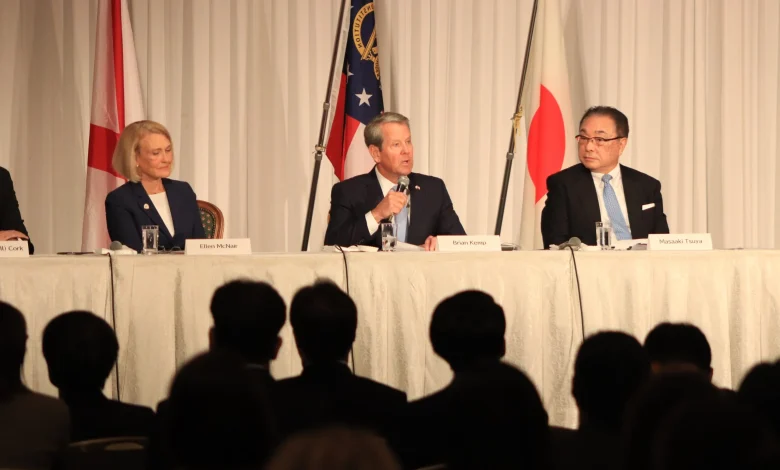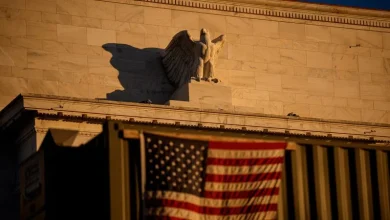By the Numbers: Southern States Outline Japanese Investments, Showing What Was at Stake in Trump’s Trade Talks

It’s not quite the 1970s and ‘80s, when rising Japanese imports triggered business backlash and xenophobic incidents in the U.S.
But with echoes of that not-so-distant era present in today’s tariff-dominated trade landscape, it’s vital to remember how far the relationship has come — and how dependent many Southern communities have become on Japanese investment.
The annual SEUS-Japan conference last week in Tokyo gave states a chance to outline those growing ties on a major stage in front of state leaders and Japanese policy makers.
Masami Tyson, a former attorney now serving as the Nashville mayor’s chief of staff, shared a photo of Toshiba Drive in LaVergne, Tenn., named for a now-shuttered factory that nonetheless set the stage for a wave of transformative investment.
The factory, opened in 1978, made boxy color televisions as Toshiba responded to the zeitgeist —the need to offset lower costs of overseas production with a desire to be closer to the customer and a public-relations win.
“I am told that (then-) Gov. Blanton said to Toshiba, ‘If you choose Tennessee, you could change the course of history of Tennessee.’ He said that if a global company like Toshiba came, then others would surely follow,” said Ms. Tyson, who in 2023 represented the state at the SEUS conference.
That vision proved true — while Toshiba eventually closed, Nissan opened five years later, releasing a wave of Japanese investment that has now created 60,000 jobs, she added.
Even after what President Trump lauded as a breakthrough deal during his meeting with Prime Minister Sanae Takaichi, average tariffs of 15 percent Japanese goods leaves that rate six times higher than it was before he came into office. And that comes on top of a protracted period of 25 percent tariffs on cars and steel, from which Japanese firms are glad to have a reprieve.
For many Japanese firms, which are known for long-term planning and commitment to communities they serve, the measures have prompted the acceleration of planned U.S. expansions. Others have taken a wait-and-see approach for less urgent projects.
Indeed, the Japanese investment wave hasn’t always been even amid the creative destruction of American capitalism. Daikin postponed its community festival in Decatur, Ala., amid layoffs last year. Denkai halted a copper foil plant in Augusta, Ga., as it faced bankruptcy at home.
LaVergne continues to be affected by boardroom decisions half a world away. Bridgestone, whose former chairman also chaired the SEUS Association in Japan and played a key role in the conference, is closing down one plant there — on Bridgestone Parkway — even as it invests $550 million in another plant in Warren, Tenn. The company’s American headquarters is just up the road in Nashville.
Despite the ups and downs, statistics shared by the heads of each delegation a day after Mr. Trump’s visit to Tokyo showed how much the region has at stake in ensuring Japanese companies remain healthy, in part by ensuring strong operations in the world’s largest market.
Below is a tour of the seven states that put some meat on the broader expressions of goodwill, explaining — in dollars, cents and jobs — why more than 400 Southerners traveled across the world to meet with some of their top partners, investors, and dare many of them say, friends.
The Governors
Georgia
Head of delegation: Gov. Brian Kemp
Japanese investment and trade: 400+ companies with more than 40,000 jobs; $8.2 billion in
Quotable or superlative:
Nothing demonstrates a successful business climate and partnership more than a company choosing to expand in your state. That’s why we are so grateful to have assisted with more than 50 expansions of Japanese companies in Georgia over just the last few years alone. That is on top of Japan based companies already employing more Georgians than any other international business community in our state.
Key companies or projects mentioned: Bridgestone, Kajima, Kubota, Rinnai, Shimizu, TOTO (recent $224 million expansion), Toyota, Yokugawa Corp., YKK
North Carolina
Head of delegation: Gov. Josh Stein
Japanese investment and trade: 230 Japanese companies employing 36,000 peopl
Quotable or superlative:
“This is the largest delegation our state has ever brought to a Tokyo meeting. It reflects the immense importance that we place on our relationship with the nation people and businesses of Japan.”
Key companies or projects mentioned: Honda Jet developing a model that can fly nonstop across the U.S.; $3.2 billion Fujifilm investment in the Research Triangle, and the crown jewel: a $14 billion battery factory to make hybrid EV and plug-in vehicles in Randolph County, creating 5,000 jobs.
Intangibles: North Carolina hosted the last SEUS-Japan conference in Charlotte and chaired this year’s event.
Tennessee
Head of delegation: Gov. Bill Lee
Japanese investment and trade: 200 Japanese companies employing 60,000 people
Quotable or superlative:
“The reason that we are so grateful for this, for the companies that decide to invest in our state, is because Tennesseans lives are enhanced when a Tennessee family member chooses to take a job with one of the companies that has chosen to invest in our state, they’re taking that job because it’s a better job than The one they had before, because it is a better way of life for their family.”
“For the past 40 plus years, Tennessee communities have been enriched by the cultural injection, by the cultural exchange of Japanese who’ve come to our state.”
Key companies or projects mentioned: Nissan put its first U.S. manufacturing plant near Nashville in 1983; corporate headquarters for Bridgestone, Hitachi and Toyota. Mitsubishi Motors recently located its American headquarters in Franklin, Tenn., just outside Nashville. The Consulate General of Japan for Tennessee and three other states is based in Nashville and helmed by Consul General Shinji Watanabe.
Former Bridgestone Chairman Masaaki Tsuya, who chaired the Japan side of the conference, toasts with governors and business leaders, incluidng his counterpart on the U.S. side — Toyota Motor North America
President Don Stewart, far right — as the conference comes to a close. Credit: Trevor Williams / Global Atlanta
Other Heads of Delegation
Alabama
Head of delegation: Commerce Secretary Ellen McNair
Japanese investment and trade: 80+ Japanese companies employing more than 25,000 people
Quotable or superlative:
“These are long-term, high-quality jobs that are transforming communities and building opportunities for generations to come. This alliance isn’t built on promises, it is truly built on performance.”
“We know the stakes, we know the standards, and we know that Japanese companies have a choice when it comes to investment. Alabama is honored that so many have chosen us.”
Key companies or projects mentioned: Daikin America, one of the earliest Japanese investors in the state, has established an annual cultural festival in Decatur, Ala.; Mazda-Toyota Manufacturing in Huntsville has created more than 4,000 jobs on a multibillion-dollar investment. Toyota Motor Manufacturing Alabama, also in Huntsville, has made 10 million engines in Alabama after five expansions.
Florida
Head of delegation: Secretary of State Cord Byrd
Japanese investment and trade: 200 Japanese companies accounting for 22,000 jobs on $9 billion and $6.6 billion in trade
Quotable or superlative:
“These are long-term, high-quality jobs that are transforming communities and building opportunities for generations to come. This alliance isn’t built on promises, it is truly built on performance.”
“We are globally connected. We have 21 airports, 16 deep water seaports, advanced highway and rail networks, modern fiber optic networks and several major high speed data transmission hubs. We’re also the gateway to space. A record 100 satellite launches are projected by the end of 2025 we also have an unmatched quality of life.” —Noted as the conference focused on space as the next frontier in the U.S.-Japan relationship
Key companies or projects mentioned: Bridgestone, Fujifilm, Hitachi, Honda, Mitsubishi, Pilot Pen, Sony and Suzuki; sister state agreement that has led to cultural and art exchanges with Wakayama prefecture in the Kansai region near Osaka. Consul General Junya Nakano serves Florida from Miami.
Mississippi
Head of delegation: Bill Cork, executive director and chief economic development officer at the Mississippi Development Authority
Japanese investment and trade: 130 Japanese companies
Quotable or superlative:
“These companies represent our strength in manufacturing, but they are also proof of Mississippi’s reliability as a partner, our people, and our open for business approach that welcomes new partners and delivers results. We are grateful for Japan’s continued confidence in Mississippi, and we’re eager to build to keep building on that trust, and this alliance is a great way to do just that.”
Key companies or projects mentioned: Nissan has invested more than $4 billion in its Canton, Miss., plant, where it is making the Frontier pickup and will soon manufacture a retooled Xterra model; Asia representative office located in Osaka. Toyota has a $1.2 billion plant in Blue Springs, Miss., which makes the Corolla and will soon make a hybrid model of the small sedan starting in 2028. Tokyo-based chemical company Kuraray owns Calgon Carbon Corp., which has a massive facility along Mississippi’s Gulf Coast. Food producers Aji-no-moto and Calbee America both have a presence in the state. The state delegation met with prospects and existing investors including Kawasaki Heavy Industries during their trip to Tokyo.
South Carolina
Head of delegation: David Royer, director, South Carolina Department of Commerce Tokyo office
Japanese investment and trade: 60 companies, 90 facilities; more than $2.5 billion in investment over the last eight years.
Quotable or superlative:
“Thanks to leaders like the ones in this room, the Southeast has become the fastest-growing economic regions in the United States, driven by manufacturing, logistics, energy and technology, our region has worked to become the heart of manufacturing the US and develop robust workforce programs to keep up with demand, actively diversifying, diversifying beyond manufacturing, building on opportunities such as life science and advanced energy.”
Key companies or projects mentioned: Isuzu announced a $280 million commercial truck assembly operation in Greenville, S.C. in February.





